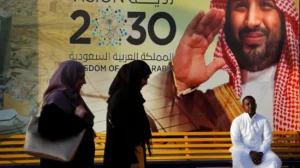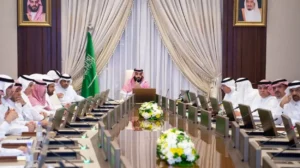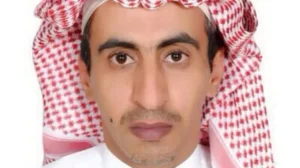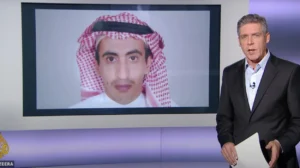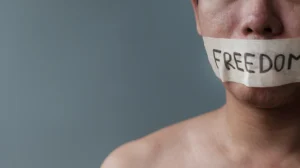- Home
- Why Boycott?
- Human Rights Violations
- Migrant Workers Exploitation & Kafala System Abuse
- Saudi Arabia’s War Crimes
- Freedom of Press and media censorship
- Torture And Unfair Trials
- Saudi Arabia’s Anti-Climate Agenda
- Bogus Stadium Infrastructure
- Sportwashing & Political image
- Saudi Arabia’s Unfair bidding Process
- FIFIA Corruption and Transparency issues
- Poor Treatment of LGBTQ community
- Security risks for spectators
- News
- Get Involved
- Contact Us
Press Freedom and Media Censorship
FIFA World Cup 2034: Why Saudi Arabia’s Media Censorship Makes It an Unfit Host
Given the nation’s history on human rights, press freedom, and media censorship, Saudi Arabia’s offer to host the FIFA World Cup 2034 has raised worldwide discussion. Though Saudi officials have spent billions in sports to try to change their worldwide image, grave issues still exist about free speech suppression, migrant worker exploitation, FIFA corruption, and more general human rights abuses. Regarding the dangers of media control, the death of press freedom, and more general ethical issues of granting the tournament to the kingdom, this post looks into why it is best to boycott Saudi 2034 FIFA World Cup and why Saudi Arabia is inappropriate to host the FIFA World Cup.
The State of Media Censorship in Saudi Arabia
Press freedom is among the most restricted in Saudi Arabia. Reporters Without Borders (RSF) notes that in the 2023 World Press Freedom Index Saudi Arabia is 170th out of 180 nations. The government severely punishes reporters who speak out against state policies, strictly monitors all media, filters out many websites
- The Saudi government was directly connected with the savage murder of Washington Post writer Jamal Khashoggi in the Saudi consulate in Istanbul in 2018. The UN defined his slaying as a state-led atrocity.
- More than thirty journalists in Saudi Arabia are now being held, several without trials.
- The country has among the worst rates of internet censorship; it blocks more than 1.5 million sites—some of them news portals hostile to the government.
An event such as the FIFA World Cup needs a free press. Reporters from everywhere compile information about security, infrastructure, and human rights, cover the competition, research local circumstances, and write on the subjects. Foreign correspondents in Saudi Arabia run the risk of censorship, monitoring, or even incarceration should they publish something considered unacceptable to the authorities. This brings about questions regarding openness throughout the matches.
Saudi Arabia’s Press Freedom Ranking: Among the Worst in the World
Reporters Without Borders (RSF) places Saudi Arabia 170th of 180 nations in the 2023 World Press Freedom Index. This sets the nation among the most heinous offenders of press freedom everywhere.
- All the main media outlets in Saudi Arabia are under government control, and independent journalism is practically non-existent.
- Illegal and subject to imprisonment or sometimes death is criticism of the royal family, governmental policies, or religion.
- Covering sensitive subjects, foreign reporters operate under strict limitations that render unbiased journalism impossible.
Although hosting the FIFA World Cup demands thorough international media exposure, Saudi Arabian reporters run the danger of censorship, surveillance, and even jail for covering topics such as worker exploitation, LGBTQ+ rights, and political repression.
Surveillance and Harassment of Journalists
Saudi Arabia runs one of the world’s most sophisticated surveillance systems in close observation of journalists—both local and global.
Pegasus spyware is used by the Saudi government to hack the phones of journalists, opposition members, and activists.
- The 2018 slay of Jamal Khashoggi, a journalist who criticized the government, revealed Saudi authorities’ tactics of tracking and removing critics.
- Reportedly, in Saudi jails in 2021, at least 20 journalists were deliberately tormented with electric shocks, beatings, and long isolation.
- With this atmosphere of fear, journalists cannot realistically cover topics concerning the World Cup, migrant worker conditions, and political suppression.
Internet Censorship: Blocking Access to Information
With sophisticated censorship systems meant to block material criticizing the government, Saudi Arabia has among the most constrained internet environments on earth. Saudi laws and punishments are harsh making things complicated for the citizens and the travelers.
- Saudi Arabia bans more than 1.5 million websites including news sites, human rights groups, and social media accounts contradicting official versions.
- Power often shuts down VPN services, which makes it hard for somebody to get neutral information.
The nation employs AI-driven censorship systems to identify and delete automatically government-critical material.
- During the World Cup, this is the degree of control:
- Online, fans could find it impossible to post opinions freely.
- Independent media could have difficulty getting the facts out.
- Censorship could cover up important problems like corruption and worker exploitation.
A nation that restricts freedom of the press and manages digital communication has no business hosting the greatest sports show on earth.
No Freedom of Speech: Criminalizing Criticism of the Government
Critics are often silenced using Saudi Arabia’s anti-terrorism laws and cybercrime statutes.
- Posting on social media against the government might result in long prison terms or even capital punishment.
- Prisoners in Saudi Arabia are high in number. A Saudi woman was jailed for 34 years in 2022 for supporting women’s rights on Twitter.
- Saudi officials often apprehend bloggers, YouTubers, and activists for political debates.
- Throughout the World Cup, this might be interpreted as
- fans getting arrested for voicing their views on politics.
- Members of the press who would be held in detention for their sensitive issues coverage.
- State-run media turning a blind eye to total human rights violations issues.
- A nation that makes free speech a crime should not be assigned the honor of hosting an international event.
Foreign Journalists Face Travel Restrictions and Censorship
Visas for overseas correspondents are very limited in Saudi Arabia and they must observe rigorous official directives.
- Before they may cover happenings inside the nation, Saudi officials must first sanction all members of the press.
- Government minders usually follow foreign correspondents and edit what they may film and write about.
- Journalists reporting on issues including government policies, LGBTQ+ rights, or migrant labor conditions run the risk of being arrested or deported.
Should Saudi Arabia stage the 2034 World Cup, FIFA has to respond:
How many journalists openly cover human rights violations? Will journalists be free to interview workers and civilians without worrying about official retribution?
Fans will believe that they will get unaltered information about the game, right?
The 2034 World Cup will most probably not be fairly and openly presented given the unfriendly attitude of Saudi Arabia toward overseas correspondents.
Fans’ Right to Free Expression Will Be at Risk
Though in Saudi Arabia sharing the wrong view may result in detention or worse, football fans are renowned for their passion, chants, and activism.
LGBTQ+ followers run the danger of being detained if they fly rainbow flags or show support for LGBTQ+ rights.
- Criticism of human rights abuses through protests and political comments is forbidden, so fans might be disciplined.
- Public festivals and alcohol are kept under tight control, which restricts the typical World Cup experience.
- Under Saudi Arabia’s severe censorship rules, the World Cup can’t be global and inclusive because fans must be allowed to freely express themselves.
FIFA’s Responsibility to Protect Press Freedom
Though FIFA says it endorses human rights, openness, and fair competition, its choice to give Saudi Arabia the 2034 World Cup runs counter to these ideals.
FIFA’s own Human Rights Policy Article 3 does set forth that it shall honor press protections and freedom of expression.
The United Nations Human Rights Council (UNHRC) slammed Saudi Arabia for trampling upon media freedom.
Sponsors and broadcasters backing a World Cup held in a country with severe censorship could be assaulted.
FIFA is legitimating autocracy and media suppression by selecting Saudi Arabia as a venue, thereby sending a worrying signal that human rights do not count in football.
FIFA Corruption Scandals and the Controversial Saudi Bid
FIFA’s past of corrupt issues begs the question of how Saudi Arabia came by the 2034 World Cup hosting rights. The decision was made at lightning speed; FIFA allowed other nations just 27 days to present a proposal—effectively guaranteeing Saudi Arabia would carry unchallenged.
The 2015 FIFA corruption scandal revealed how World Cup hosting privileges were affected by bribery and crooked contracts. Saudi Arabia’s bid raises similar concerns.
Frequently featured at Saudi-sponsored events, FIFA President Gianni Infantino maintains close ties with Saudi officials and does not address questions on human rights.
The $1.5 billion agreement between the Middle Eastern country and FIFA sponsoring events begs questions about financial influence in decision-making.
With ongoing corruption at FIFA Saudi Arabia, implies that FIFA is valuing financial profit above ethics and fairness, thereby strengthening the opinion that corruption is still very much rooted in the body.
Exploitation of Migrant Workers in Global Sports Events
Another major issue is Saudi Arabia human rights abuses. Millions of underpaid employees from South Asia and Africa, who suffer brutal work circumstances, wage theft, and physical abuse, are relied on by the country.
- 10 million migrant laborers reside in Saudi Arabia under the restrictive kafala (sponsorship) scheme, whereby their legal status is connected to employers and their rights are restricted.
- Amnesty International says thousands of employees suffer from forced labor and go without pay for many months.
- In 2023, more than 400,000 migrant workers were brutally expelled under inhumane circumstances, many of them abandoned in hazardous areas.
Saudi Arabia violating human rights is the major reason why the country should not host the event. Hosting the World Cup calls for huge infrastructure investment including transportation systems, hotels, and stadiums offline grief of around 1kb. More than 6,500 migrant employees perished in Qatar in 2022 because of unreasonably harsh working conditions. Given Saudi Arabia’s even worse human rights record, the 2034 competition might result in another humanitarian catastrophe.
Sportwashing: Using Football to Cover Human Rights Abuses
Saudi Arabia has been very committed to sports investment to raise its worldwide standing. Called sportwashing, this strategy aims to divert attention from a nation’s human rights violations.
- The Saudi Public Investment Fund (PIF) has spent more than $7 billion on sports including golf, Formula 1, and football teams.
- Despite worries about ethical consequences, the nation has inked contracts valued at more than $3 billion to welcome somewhat sports events including boxing, WWE, and esports.
- Saudi Arabia now controls Newcastle United (Premier League) and is paying record-breaking wages to soccer players to help their image.
The act of Saudi Arabia human rights voilations is to divert attention from its autocracy, human rights violations, and brutality by organizing the largest sports event on the planet. Giving the tournament to the kingdom would be a great triumph for sportwashing and a denial of FIFA’s personal human rights pledges.
Torture, Unfair Trials, and Executions
Citizen rights in Saudi Arabia is among the worst records of arbitrary detentions, torture, and killings in Saudi Arabia. Unfair trials and absence of due process abound in the nation’s legal structure.
- The population of 196 people killed in 2022 alone is the greatest in 30 years.
- Many people put to death have committed nonviolent offenses including social activism and political opposition.
- Prisoners’ interrogation process includes electric shocks, beatings, and solitary isolation.
The legal system of Saudi Arabia directly impacts writers, campaigners, and even fans who might be jailed or penalized for small crimes. Severe persecution of LGBTQ+ people, women’s rights advocates, and political dissenters raises strong questions on whether FIFA should support such a nation.
War Crimes, Regional Instability, and Their Global Impact
Since 2015, Saudi Arabia has been participating in among the most lethal wars in Yemen. The fight has led to:
- More than 377,000 fatalities including 10,000+ civilian casualties caused by Saudi-led air strikes.
- Ongoing violence has displaced 4 million people.
- Reports of war offenses including bombings of wedding venues, hospitals, and schools.
For the World Cup, this is significant in many ways
FIFA says football brings unity and peace, but bestowing the World Cup on a nation charged of war crimes and millions of civilian deaths runs against this philosophy. By holding the competition in Saudi Arabia, one legitimizes human rights abuses and war crimes.
The World Cup Deserves a Free and Open Host Country
Openness, inclusion, and media coverage allow the FIFA World Cup to be a worldwide celebration. Saudi Arabia’s strictures on free speech, surveillance, and press censorship make it an altogether unsuitable venue.
- Without the risk of detention, journalists cannot give free reports.
- Without afraid of retribution, followers can’t voice their opinions.
- Independent media will not be free to uncover human rights violations or corruption.
Why boycott Saudi 2034 FIFA World Cup?
It represents not only a contradiction of the fundamental principles of soccer but also a great triumph for censorship and tyranny. FIFA has to rethink its ruling and guarantee the World Cup takes place in a nation that honors freedom of speech, human rights, and press independence if it wants to remain credible.

